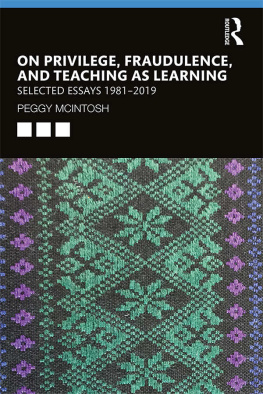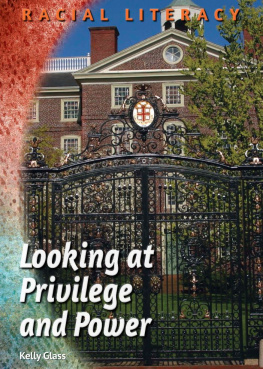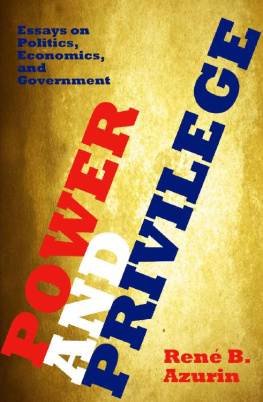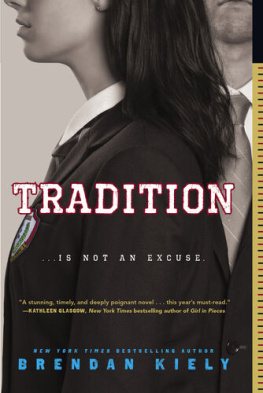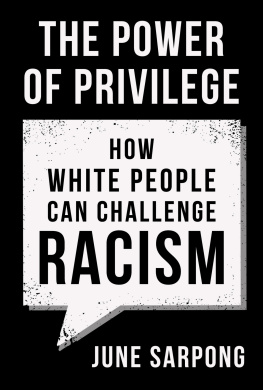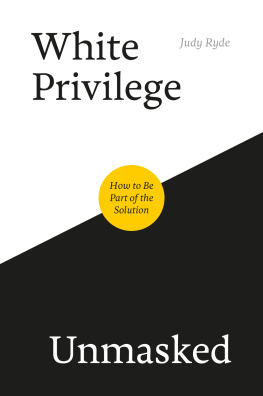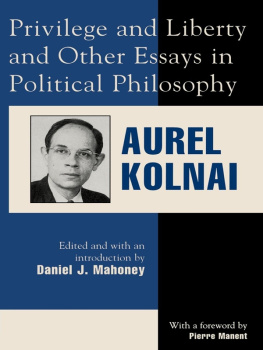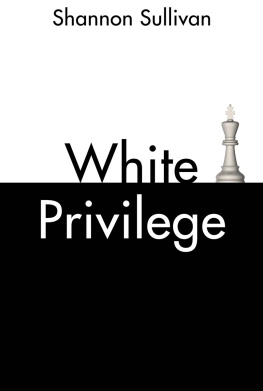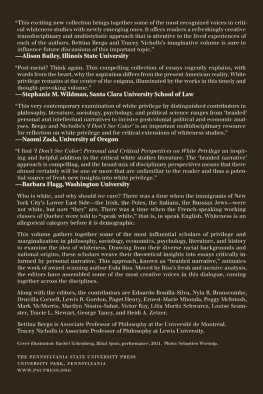ON PRIVILEGE, FRAUDULENCE, AND TEACHING AS LEARNING
From one of the worlds leading voices on white privilege and anti-racism work comes this collection of essays on complexities of privilege and power. Each of the four parts illustrates Peggy McIntoshs practice of combining personal and systemic understandings to focus on power in unusual ways. Part I includes McIntoshs classic and influential essays on privilege, or systems of unearned advantage that correspond to systems of oppression. Part II helps readers to understand that feelings of fraudulence may be imposed by our hierarchical cultures rather than by any actual weaknesses or personal shortcomings. Part III presents McIntoshs Interactive Phase Theory, highlighting five different world views, or attitudes about power, that affect school curriculum, cultural values, and decisions on taking action. The book concludes with powerful insights from SEED, a peer-led teacher development project that enables individuals and institutions to work collectively toward equity and social justice. This book is the culmination of forty years of McIntoshs intellectual and organizational work.
Peggy McIntosh, Ph.D. is Senior Research Scientist of the Wellesley Centers for Women at Wellesley College in Massachusetts. She has taught at the Brearley School, Harvard University, Trinity College (Washington, D.C.), the University of Denver, the University of Durham (UK), and Wellesley College. She is Founder of the National SEED Project on Inclusive Curriculum (Seeking Educational Equity and Diversity) which she co-directed with Emily Style during the Projects first twenty-five years. McIntosh is author of forty book chapters and articles, including the seminal paper White Privilege: Unpacking the Invisible Knapsack. She consults widely in the United States and throughout the world with organizations and educators who are creating more gender-fair, multicultural, and relational workplaces and schools.
It is rare that one gets the chance to meet or read in ones lifetime the originator of a new way of thinking or believing in the world of ideas. The legendary Peggy McIntosh is such a transformative figure. Her work is fundamental and foundational to our thinking on white privilege, and the subtle and myriad ways that race operates to the advantage of white folk while denying benefit and advantage to nonwhite people. She is also on par with the most gifted translators of complicated ideas and complex concepts we have had in a generation, and millions of people can trace their thinking about whiteness and privilege to her lucid and creative essays. Peggy McIntosh is a national treasure, and this powerhouse collection of her finest thinking and most brilliant reflections over the last few decades will solidify her sui generis stature as an American Original.
Michael Eric Dyson, Professor of Sociology, Georgetown University
What a gift to have this collection of Peggy McIntoshs papers! She has been a foundational leader who has already transformed our thinking and teaching, but her work will now be available to new audiences. This collection of her essays gives us her long-range view of white privilege, fraudulence, and the advancement of education through inclusion. Her work can now inspire new generations of thinkers, teachers, social justice advocates, and anyone dreaming of a more just world.
Dr. Margaret L. Andersen, Rosenberg Professor of Sociology Emerita, University of Delaware
This collection serves as a reminder that systemic power and privilege are weakened when we reignite our humanitys natural curiosity, vulnerability, and longing for one anothers well-being. Where whiteness pressures us to be experts produced by hierarchical systems and structures, these essays invite us to consider the world of knowledge we tap into when we remain grounded in one anothers life experiences and inner knowledge. This compilation is a call to co-create a more humane and connected world.
Debby Irving, Racial Justice Educator and Writer
Peggy McIntoshs transformative thought is deep, engaging, and vitally important for our times.
Hugh Vasquez, National Equity Project
These writings reveal the heart and mind of a great student of life, a great teacher, and revolutionary social thinker. Her contribution to emerging social justice discourse is incalculable.
Victor Lee Lewis, Radical Resilience Institute
ON PRIVILEGE, FRAUDULENCE, AND TEACHING AS LEARNING
Selected Essays 19812019
Peggy McIntosh

First published 2020
by Routledge
52 Vanderbilt Avenue, New York, NY 10017
and by Routledge
2 Park Square, Milton Park, Abingdon, Oxon OX14 4RN
Routledge is an imprint of the Taylor & Francis Group, an informa business
2020 Peggy McIntosh
The right of Peggy McIntosh to be identified as author of this work has been asserted by her in accordance with sections 77 and 78 of the Copyright, Designs and Patents Act 1988.
All rights reserved. No part of this book may be reprinted or reproduced or utilised in any form or by any electronic, mechanical, or other means, now known or hereafter invented, including photocopying and recording, or in any information storage or retrieval system, without permission in writing from the publishers or the author. In addition, Peggy McIntosh retains sole right to license, reproduce, or reprint all material published prior to 2019. The original publication dates are found in the chapter references. Readers are urged to cite previously published material accurately with regard to original publication dates.
Trademark notice: Product or corporate names may be trademarks or registered trademarks, and are used only for identification and explanation without intent to infringe.
Illustrations by Shebani Rao
Library of Congress Cataloging-in-Publication Data
A catalog record for this title has been requested
ISBN: 978-0-8153-5404-8 (hbk)
ISBN: 978-0-8153-5411-6 (pbk)
ISBN: 978-1-351-13379-1 (ebk)
I dedicate this book to its readers.
I give it to you in appreciation, solidarity, respect, and friendship.
CONTENTS
Peggy McIntosh, Ph.D. Harvard University, was born in Brooklyn, NY and grew up in New Jersey. She attended public schools and George School in Pennsylvania before getting her B.A. at Radcliffe College. She has taught at The Brearley School, Harvard University, Trinity College (Washington, D.C.), the University of Denver, the University of Durham (UK), and Wellesley College. She is the author of forty book chapters and articles, including the classic essay White Privilege: Unpacking the Invisible Knapsack. McIntosh founded the National SEED Project on Inclusive Curriculum (Seeking Educational Equity and Diversity), which she co-directed with Emily Style from 1987 to 2011. She has spoken at more than 600 colleges, universities, and organizations around the world. She has four honorary degrees and the Klingenstein Award for Distinguished Educational Leadership from Columbia University.
Emily Style, B.A. Calvin College, M.A. New York University, grew up in Michigan and became a high school English teacher in New Jersey. She is author of the 1982 book Multicultural Education and Me and the influential 1988 essay Curriculum as Window & Mirror. She has done adjunct teaching at colleges and consulting in schools across the United States. From 1987 to 2016, she co-directed the National SEED Project on Inclusive Curriculum (Seeking Educational Equity and Diversity). She also directed the New Jersey SEED Project from 1994 to 2002. Semi-retired, she now lives in Massachusetts where she continues to write poetry and do other kinds of thinking as well.

